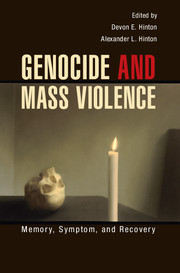Book contents
Foreword: What Does Trauma Do?
Published online by Cambridge University Press: 05 November 2014
Summary
Read the chapters in this book and feel, carry, resist, fight the weight, the heavy yoke of tragedy. Mass violence has been part of the human experience for as long as recorded history and weighs us down to this day. In the American Civil War 750,000 soldiers on both sides lost their lives, and the subsequent decades were dominated by national preoccupation with suffering, loss, and grief (Faust, 2008). Colonialism introduced mass violence to all the continents, with slavery accounting for a huge toll of human misery and death. In the meat grinder of trench warfare during World War I, millions of British, French, and German soldiers were killed and millions more wounded. The Battle of the Somme alone cost the British 450,000 casualties, 50,000 on the first day. That war ended with European societies expressing revulsion against all forms of mass violence, and yet just twenty years later a Second World War killed more than 50 million men and women (most of whom were noncombatants) and displaced hundreds of million more. The war embedded the Holocaust, still the symbol of mass violence as an institutional product of evil. Historians claim that the former Soviet Union may have killed even more people than the Nazis. And this outline of mass violence is only a preliminary to the many and different more recent forms of mass killing described in the chapters that follow.
Whatever the human cost of such immense and continuing destruction it must be staggering. China’s Great Leap Forward famine, which killed 30 million rural Chinese, was the unintended consequence of one of the most destructive social policies in human history, but no one knows its toll on families and networks in Chinese villages. The same can be said for the Cultural Revolution (Kleinman et al., 2011). And that is true of much of mass violence. We simply do not know what effect, especially over the long term, it has had on society, on interpersonal bonds, on local moral worlds, and on subjectivity.
- Type
- Chapter
- Information
- Genocide and Mass ViolenceMemory, Symptom, and Recovery, pp. xiii - xviPublisher: Cambridge University PressPrint publication year: 2014



